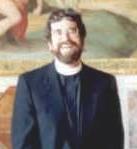
Believing that God created the universe in six days is a form of superstitious paganism, the Vatican astronomer Guy Consolmagno claimed. Brother Consolmagno, who works in a Vatican observatory in Arizona and as curator of the Vatican meteorite collection in Italy, said a "destructive myth" had developed in modern society that religion and science were competing ideologies. He described creationism, whose supporters want it taught in schools alongside evolution, as a "kind of paganism" because it harked back to the days of "nature gods" who were responsible for natural events.
Consolmagno, a former teacher at Harvard and MIT, became a Jesuit in 1989. Since then, his studies have focused on, among other things, the origin and evolution of small bodies within the solar system. In an interview given in 2005 to Astrobiology magazine, Consolmagno stated,
Science has to start with an assumption. Newtonian physics started with the assumption that everything is due to cause and effect. And, lo and behold, it seems to prove that everything is due to cause and effect. But it's not a proof, it's just recovering your assumption. Quantum theory says everything is chance. And by golly, you can show that according to quantum theory, everything is chance. No, you don't prove it; it's an assumption that allows you to get a handle on the universe. You can say that the universe works the way it does because of a beneficent creator -- that's a perfectly reasonable way to start out looking at the universe, but it's no proof. It's your assumption.Poor, silly King David. What was he thinking when he wrote passages like:
The heavens declare the glory of God;And the firmament shows His handiwork. (Ps. 19:1,NKJV)
and:
I will praise You, for I am fearfully and wonderfully made; Marvelous are Your works, And that my soul knows very well. (Ps. 139:14,NKJV)
It's painfully obvious that David was a simple farmer who never taught at Harvard or MIT.
In the end though, if Consolmagno ruffles feathers at the Vatican, it may be for other reasons:
Brother Consolmagno, who gave a speech at the Glasgow Science Centre, entitled "Why the Pope has an Astronomer", said the idea of papal infallibility had been a "PR disaster". What it actually meant was that, on matters of faith, followers should accept "somebody has got to be the boss, the final authority".
"It's not like he has a magic power, that God whispers the truth in his ear," he said.


